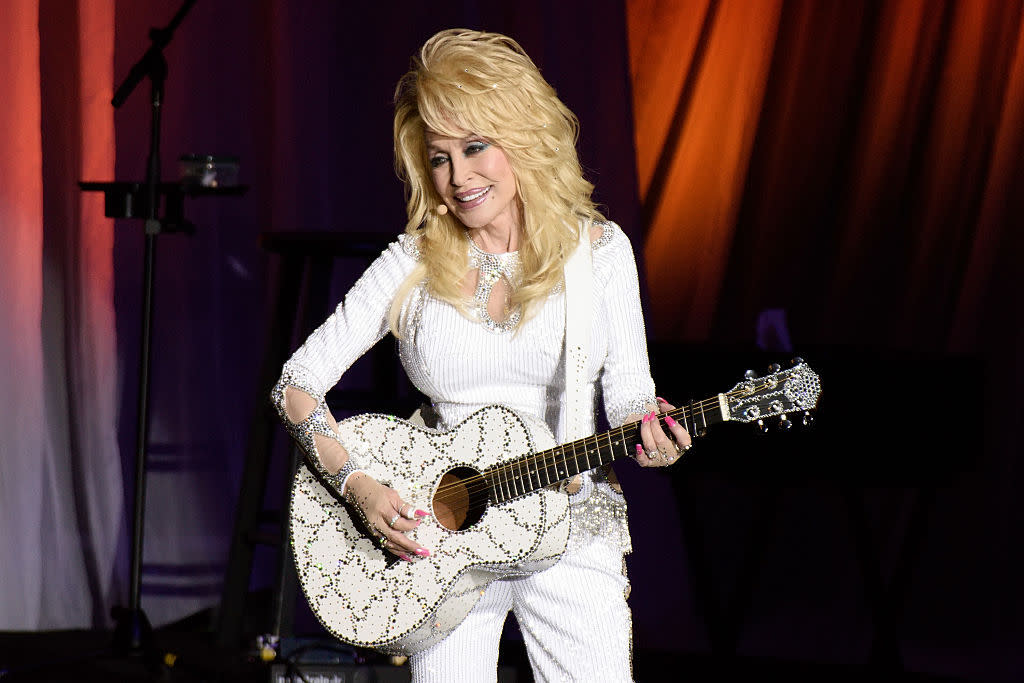Dolly Parton Talks ‘Jolene,’ ‘I Will Always Love You,’ and the ‘Pure & Simple’ Joy of Songwriting

It’s 8:30 a.m. Nashville time when Dolly Parton calls in for our scheduled interview. Although it is release day for her new album, the aptly titled Pure & Simple, and this is her third straight day of press, her trademark jubilant spirit is as strong as ever. “Today we’re in Nashville winding up all the publicity, so we’ll be working half a day. You are part of my workday; thank you for your help!” she says graciously.
She estimates this is her 43rd album in five decades; though she is unsure of the exact number, sharing her music with the world is still a very big deal for her. “It’s always new and exciting, even after all these years,” she says. “New music is always exciting.”
As for her classic old material, Dolly Parton is undoubtedly one of the great American songwriters — a legend whose classic compositions have been covered by everyone from Patti Smith and the White Stripes to, perhaps most famously, Whitney Houston with “I Will Always Love You.” Her track record is undeniable. However, Parton admits that she never knows for sure if a song will be a commercial success.
Still, looking back, Parton says she felt she had something special with two of her most iconic tunes, “I Will Always Love You” and “Jolene.”
“You do, as a writer, have an inner feeling about a song,” she confesses. “‘I Will Always Love You,’ that song was written from an emotional place at an emotional time, when I was leaving the Porter Wagoner show, and all those musicians that played on that session had played on all my records — all of mine and Porter’s hit records up to that time. So everybody had a sense and feeling that was a parting of the ways, and that song was written as a goodbye. And they knew my and Porter’s emotional state at that time. And the song itself is such a good song. I’m so proud of that song. It’s very simple, it’s not complicated, but it was just such a singable thing, and I was very emotional. Every musician and Porter, the engineers and myself, were all crying when we did the song.”
“Jolene” had a completely different – but just as profound — impact on Parton. “When we did ‘Jolene’ it was a fun thing; there were not the emotional tears and all, but everybody was so excited,” she recalls. “I had written a little lick, that little ‘Jolene’ lick, so when we got in to work it out, all the musicians were saying, ‘Wow, this is such a clever little thing.’ So everybody got excited about it, and we made such a good record that day.”
For Parton, the new album Pure & Simple accompanies a massive tour that, by the time it’s completed in December, will have hit more than 60 cities, including two nights at the iconic Hollywood Bowl. Having new material to play live is always a joy for Parton — especially since as the writer and performer of her songs, she can take play them exactly how she wants.
“When you get so many talented people, so many of them have so many original and great ideas; they start handing those things to it and it really brings it to life. A good example: When I wrote ‘I’m Sixteen,’ I thought that could be a song that would be absolutely perfect done a cappella, with no music,” she recalls. “[But] I was torn at that time whether just to do that with voices and just the bass guitar or no bass guitar. So sometimes you get kind of torn into knowing what exactly what you want to do, so the point is we’re gonna actually probably do both…When [songs are] yours, you can take all the liberties you want to, and you don’t have to worry about what somebody else is going to be able to say – ‘cause it’s yours, and you can screw it up if you want to!”
It should come as no surprise to any who have been around Parton that she is a generous author and musician, one who doesn’t boast of ownership of her songs or demand credit for her genius. Instead, she views her songs as belonging to all.
“As a songwriter there’s nothing more exciting, ever, than to hear a song come to life,” she says. “It’s one thing to sit there with a guitar, or however you write a song — but to hear it actually where other musicians start adding their emotion and their sounds and their feeling to it, and all of a sudden it’s just a whole new life and it’s like, ‘Oh my God, did I write that? Did I start that in motion?’ Because so many people add so much to it, so by the time you’re done, the song really belongs to a lot of people. But when you’ve created the original seed of it, that’s what’s exciting and watching it develop and come along.”
